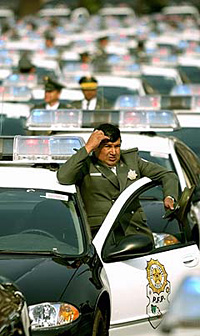 |
 |
 |
 News Around the Republic of Mexico | October 2007 News Around the Republic of Mexico | October 2007  
Mexico City Police Jail Drunk Drivers
 Frank Jack Daniel - Reuters Frank Jack Daniel - Reuters
go to original


| | Mexico City police were last month armed with new powers to ban drivers for up to three years under a points system that increases punishments for drunkenness or speeding. |
Mexico City Drunk driving has long been seen in Mexico as little worse than dropping litter, but the capital's motorists are now sobering up as police jail them on the spot for getting behind the wheel after a few tequilas.

Until recently, drivers were rarely stopped while under the influence and they could usually bribe the city's notoriously corrupt traffic cops with a few pesos to get out of trouble.

But Mexico City police were last month armed with new powers to ban drivers for up to three years under a points system that increases punishments for drunkenness or speeding.

Police checkpoints are springing up on main avenues and near night spots like the Zona Rosa bar district, and hundreds have been jailed on the spot in a drunk driving crackdown.

People realize we are applying the law and there is no way of avoiding it, said senior policeman Mauricio del Valle, who coordinates the clampdown.

He spoke as obviously drunk people left bars pumping out music and headed for their cars in the Zona Rosa.

Common in many parts of the world, random breath testing for alcohol caused shock when it was first introduced along with immediate jail time in the capital in 2003.

Drivers complained their human rights were being abused by being forced to stop at spot checks and worried it was just a new way for corrupt cops to squeeze bribes out of them.

Mexico's Supreme Court in August threw out complaints by drunk drivers that sending them to jail was unconstitutional, and police have stepped up the campaign.

SHOCKED DRIVERS

Drivers in the city are taken from their cars and imprisoned immediately for either 20 or 36 hours when found over the limit. Cameras and centrally-controlled computer images virtually eliminate the possibility of bribes.

The message has yet to get through to some residents, confident they can talk their way out of trouble or slip the cops a backhander to release them.

I'll be going home soon, said a smiling driver called Maria after a test showed her well over the legal limit of 0.04 percent blood alcohol content.

But she was bundled into a patrol car minutes later to be taken to a detention center where drunk drivers share a large cell with dozens of others. Toilets overflow and offenders sit all day with little to do.

Under a new system, motorists lose six points from their license for drunk driving or speeding and two offenses in a year mean a 3-year ban.

Police from several different departments, including doctors, staff the checkpoints, with regular visits from human rights officials to avoid abuses. Cameras and handheld computers transmit images and information from the scene to a central database to prevent drivers bribing cops.

The city police say the random testing program has more than halved the number of alcohol related traffic deaths in Mexico City from 640 in 2003 to 277 last year. The technology is expensive but its worth it, Del Valle said.

Despite getting serious on drunk driving, Mexico City cops still frequently take bribes from drivers who go through red lights, talk on cell phones, do not wear seat belts or break other traffic laws. | 
 | |
 |



